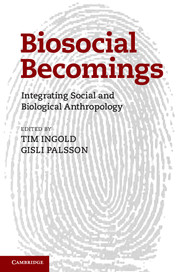Book contents
- Frontmatter
- Contents
- Preface
- 1 Prospect
- 2 Ensembles of biosocial relations
- 3 Blurring the biological and social in human becomings
- 4 Life-in-the-making: epigenesis, biocultural environments and human becomings
- 5 Thalassaemic lives as stories of becoming: mediated biologies and genetic (un)certainties
- 6 Shedding our selves: perspectivism, the bounded subject and the nature–culture divide
- 7 Reflections on a collective brain at work: one week in the working life of an NGO team in urban Morocco
- 8 The habits of water: marginality and the sacralization of non-humans in North-Eastern Ghana
- 9 ‘Bringing wood to life’: lines, flows and materials in a Swazi sawmill
- 10 Humanity and life as the perpetual maintenance of specific efforts: a reappraisal of animism
- 11 Ravelling/unravelling: being-in-the-world and falling-out-of-the-world
- 12 Retrospect
- References
- Notes on the contributors
- Index
11 - Ravelling/unravelling: being-in-the-world and falling-out-of-the-world
Published online by Cambridge University Press: 05 June 2014
- Frontmatter
- Contents
- Preface
- 1 Prospect
- 2 Ensembles of biosocial relations
- 3 Blurring the biological and social in human becomings
- 4 Life-in-the-making: epigenesis, biocultural environments and human becomings
- 5 Thalassaemic lives as stories of becoming: mediated biologies and genetic (un)certainties
- 6 Shedding our selves: perspectivism, the bounded subject and the nature–culture divide
- 7 Reflections on a collective brain at work: one week in the working life of an NGO team in urban Morocco
- 8 The habits of water: marginality and the sacralization of non-humans in North-Eastern Ghana
- 9 ‘Bringing wood to life’: lines, flows and materials in a Swazi sawmill
- 10 Humanity and life as the perpetual maintenance of specific efforts: a reappraisal of animism
- 11 Ravelling/unravelling: being-in-the-world and falling-out-of-the-world
- 12 Retrospect
- References
- Notes on the contributors
- Index
Summary
Reconsidering Wittgenstein’s ‘forms of life’ (2007), Cavell arrives at the notion of ‘whirls of organisms’ (1976: 52) as a more faithful way of rendering the constitution of persons as grounded in what they do and not in what they are. Where philosophers have tended to obsess about the forms in ‘forms of life’, Cavell is more interested in life and its contingent and haphazard, though necessary movements and interlacements through the lives of others. Yet Cavell’s ‘whirl of organisms’ does not carry any sense of binding tie or relation; it rather brings to mind William Blake’s capricious ‘howling storm’. In The Palm at the End of the Mind, however, Jackson picks out a greater sense of mooring in the world in the overlapping of lives, when he writes of ‘a sense of being grounded in something I can only call “the real” that connects my life to the life of the earth itself’ (2009: 1). This most intimate connection between self and world, one which we inhabit and exist by, seems estranged from comprehension for Jackson. Wittgenstein tracks this estrangement to an existential closeness which obfuscates what is most fundamental to us: ‘The aspects of things that are most important for us are hidden because of their simplicity and everydayness. (One is unable to notice something – because it is always before one’s eyes)’ (2007: I, 129).
Of what order, if any, is the connection between person and world? I shall investigate this connection by running two parallel narratives: one theoretical, the other ethnographic and eventful. The theoretical narrative is focused on Heidegger’s account of ‘being-in-the-world’. Heidegger’s position on the relation of persons and world is much more sophisticated and nuanced than many within the humanities and social sciences have recognized and in part this chapter is an attempt to complicate our understandings of Heidegger and phenomenology. But this aim is secondary to what I am truly interested in, which is how we can think of and account for the connectivity, and also the disconnectivity, of being and world. In thinking through this problem I shall turn for help to Ingold’s trope of the ‘meshwork’ as a way of conveying a more processual and dialectical account of inhabiting the world. The ethnographic events I recount below are intended to disrupt the somewhat cosy theoretical narratives of human being as necessarily or fundamentally at-home-in-the-world.
- Type
- Chapter
- Information
- Biosocial BecomingsIntegrating Social and Biological Anthropology, pp. 211 - 228Publisher: Cambridge University PressPrint publication year: 2013



